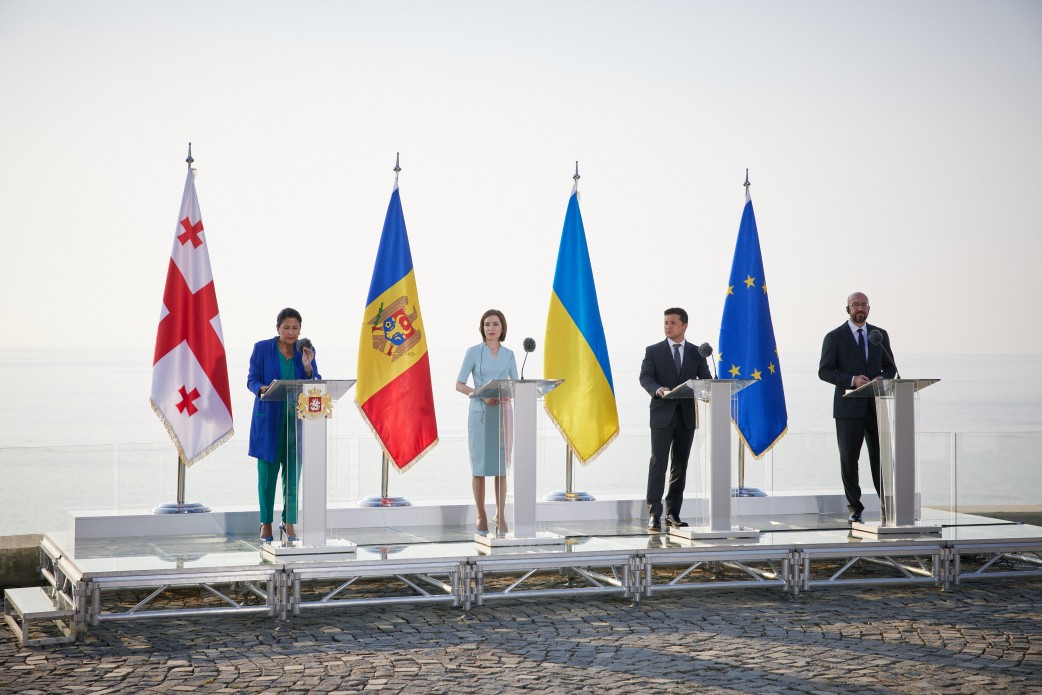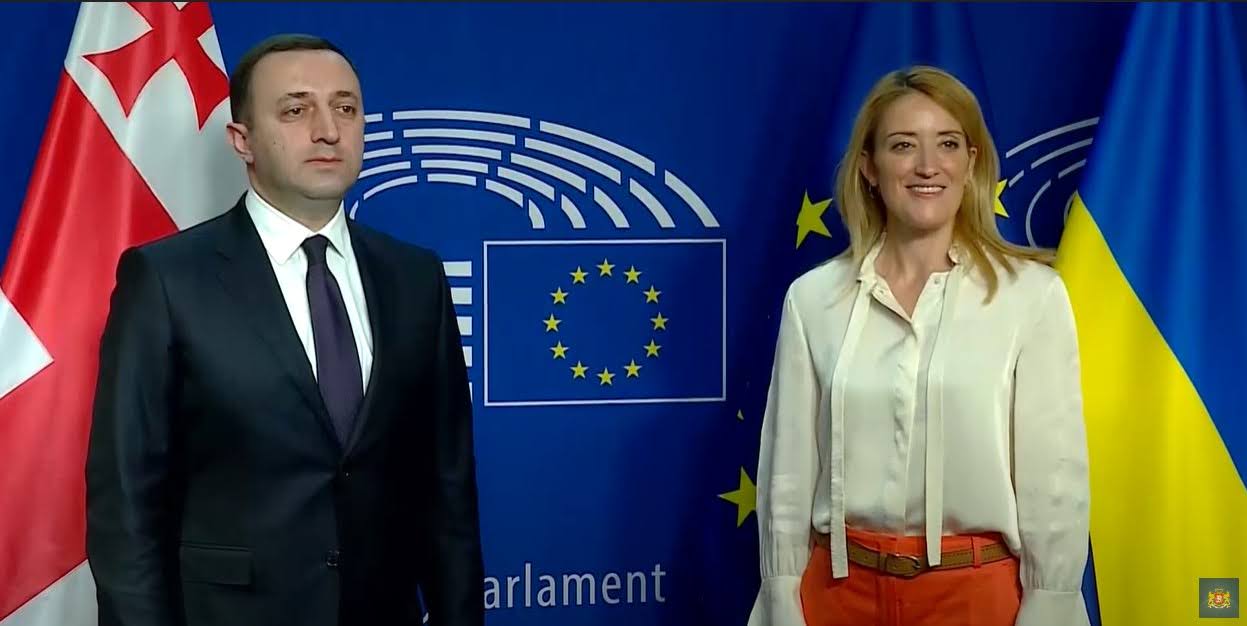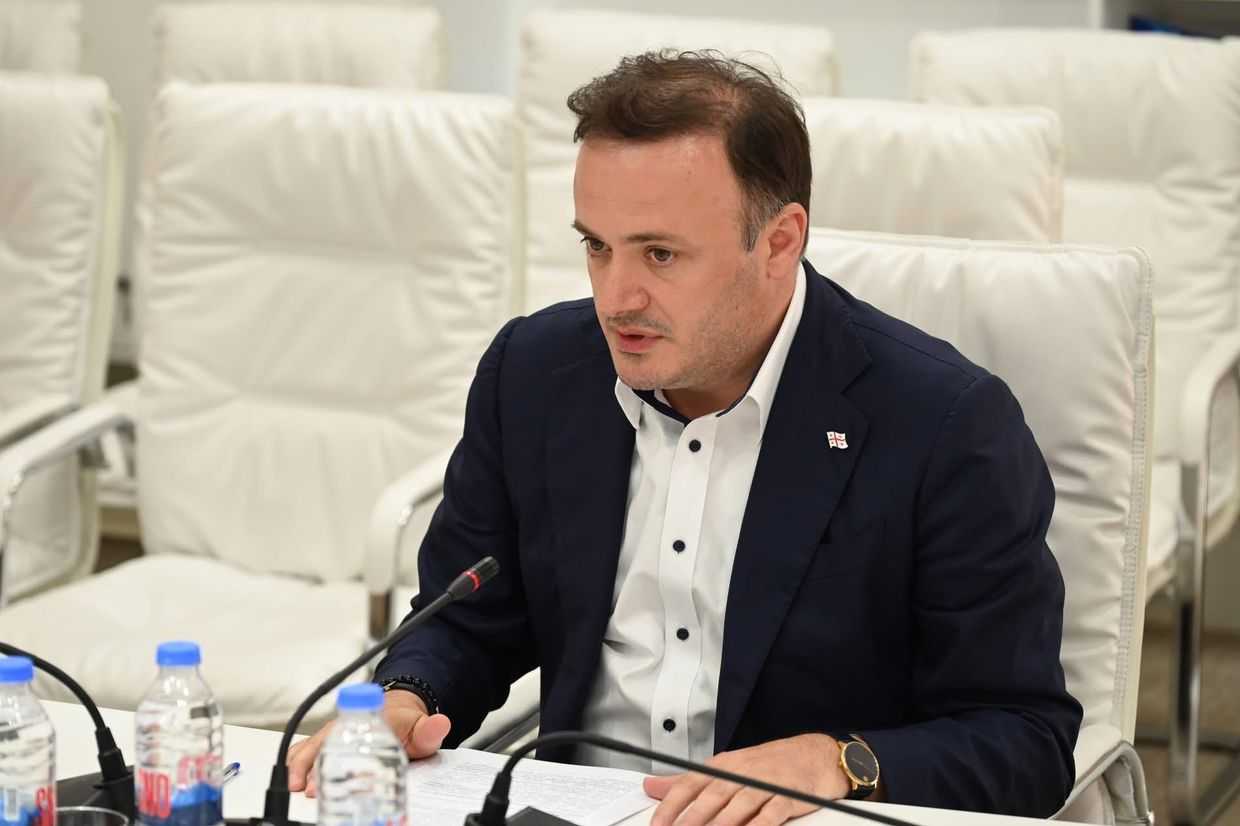
In a public address, Georgian President Salome Zurabishvili criticised the government for ‘messing up’ Georgia’s EU membership candidacy process, following a scathing resolution on Georgia from the European parliament.
Georgian President Salome Zurabishvili dedicated most of her half-hour statement on the evening of 14 June to admonishing the Georgian government and the ruling Georgian Dream party over a resolution on Georgia’s prospective membership in the European Union adopted by the European Parliament adopted last week.
The government, Zurabishvili said, ‘messed up’ its mission to advocate for the country’s EU membership candidacy.
Shortly after the European Parliament’s resolution, Zurabishvili returned from Brussels claiming that her government, once again, blocked her from visiting European capitals, which she sought to do as part of a campaign to advocate for Georgia to receive EU candidate status.
European Commission is set to make a recommendation to EU states on 17 June, with the final decision taking place on 23 to 24 June.
During her speech, the Georgian President called on Georgians to gather for an hour on the evening of 16 June at Europe Square in the centre of Tbilisi to express their support for Georgia’s EU aspirations.
The President also called on the Shame Movement, a staunchly anti-government liberal organisation, to cancel their 20 June rally and join hers instead, something that the Shame Movement swiftly rejected.
The ruling party also distanced itself from the rally, calling it poorly planned.
I appeal to @vonderleyen, who has a crucial role in the completion of the @EU_Commission recommendation for Georgia’s candidacy
I call on her to recognize the will of the Georgian people, whose soldiers stood with the Germans in Afghanistan when she served as Minister of Defense pic.twitter.com/osVWIdSsAO
— Salome Zourabichvili (@Zourabichvili_S) June 15, 2022
Salome Zurabishvili also directly appealed to European Commission President Ursula von der Leyen to support Georgia’s candidacy bid. She also vowed to reach out to the heads of every single EU member state over the issue.
‘Botched’
In her Wednesday statement, President Salome Zurabishvili claimed that Georgia has taken steps backwards on its path towards EU membership and risked alienating its own allies.
‘What I saw in Brussels is something I have to call a “botched business”’, Zurabishvili said, adding that after hosting Ukrainian and Moldovan presidents at a summit in Batumi last July, ‘Georgia has moved from the leading position to the last one’.

Salome Zurabishvili listed ‘various decisions’ by the ruling party and the government since the summit as bearing the responsibility for the country’s fading EU prospects, and that such harmful actions are still continuing.
Among these, she specifically highlighted the ruling party’s abandonment of an EU-brokered agreement with the opposition and the ‘lack of response’ to a homophobic and anti-press pogrom in Tbilisi, and the ‘ill-timed’ jailing of Nika Gvaramia, director of TV channel Mtavari Arkhi, last month.
Among other mistakes, she also mentioned the government’s rejection of EU aid, the ruling party’s refusal to reform the electoral procedure to elect the Prosecutor General, apparently partisan appointments to the Supreme Court, and the ‘abolition’ of the State Inspector’s Service.
This was not the first time Zurabishvili has criticised her erstwhile allies in recent days, and appears to be a continuation of a longer trend of growing animosity between Zurabishvili and the ruling party.
The Georgian President frustrated Georgian Dream leaders with her speech on the occasion of Georgia’s Independence Day on 26 May by hinting that ‘shamefully’, Georgia’s judiciary still had problems in Georgia. Zurabishvili also named ‘reforms of the judicial system’ among the country’s priorities in an op-ed jointly penned with President of the European Council, Charles Michel a week before.
[Read analysis on OC Media: Brokered by Charles Michel, broken by Georgian Dream]
A second front?
One of the most significant accusations directed at Georgia’s ruling authorities by the President was that they had ‘invented a topic’ in stressing the danger of Georgia unwittingly being dragged into a war with Russia.
The resolution, among other criticisms, called the Georgian Dream founder an ‘oligarch’ with ties to Russia and recommended the consideration of sanctions against him.
[Read more on OC Media: Supporters question Georgia’s EU aspirations over Ivanishvili sanctions threat]
Public outcry over Georgian Dream members’ statements continued last weekend after pro-government TV channel Imedi unveiled a public opinion survey by Gorbi asking Georgians what should be Georgia’s position if ‘the West demanded from Georgia that it become involved in a war against Russia’.
The survey results were published a day after Georgian Prime Minister Irakli Gharibashvili said that ‘if granting the [EU candidate] status is determined by war, we do not want war’.

After the survey’s publication, without referring to any specific survey results or statements, US Ambassador to Georgia Kelly Degnan described the narrative as ‘100% Russian disinformation’.
Zurabishvili, for her part, has insisted that except for occasional statements by specific Ukrainian officials, she has never heard any of Georgia’s allies expecting the country to enter into a war with Russia.
‘This has been invented’, she said, ‘it is a lie.’
‘Ungrounded’
Despite her broadside against the ruling party, Zurabshivili also rejected the language of the European Parliament’s resolution about Bidzina Ivanishvili, insisting it included ‘factually inaccurate and ‘ungrounded’ allegations.
She also went on to also rebuke some critical reactions to the resolution, including suggestions that ‘indirect sanctions’ were already in place against Ivanishvili — an apparent reply to Ivanishvili’s lawyer who suggested his client had been effectively sanctioned since March.
Ivanishvili himself has not directly made a public statement for over a year.
Zurabishvili also took aim at the country’s opposition, partially placing the blame for the resolution on the ‘consistent’ efforts of the ‘radical opposition’







